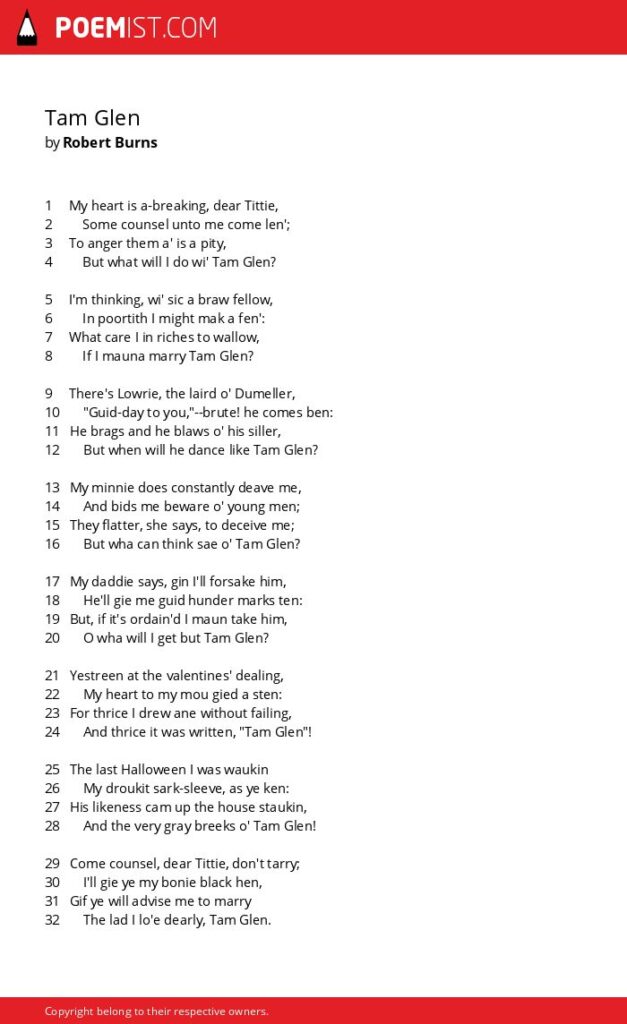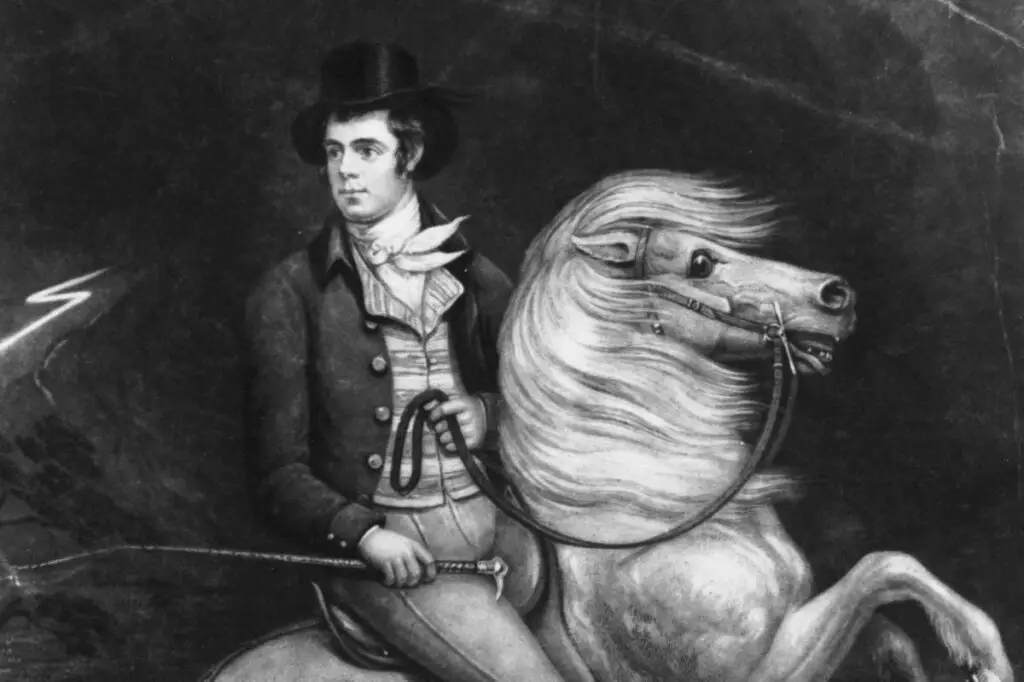“Tam Glen” is one of the best poems of Robert Burns where he speaks his thoughts. Robert Burns belongs to the poor category in his early life which is why we, the readers can see this poem.
Summary
The poem begins with the expression where he writes dedicating to his dear Tittie that his own heart is breaking. This is why some counsel on him and it becomes like a fit of anger that transformed into pity because the poet could not tell them a word.
Then he is asking a question that what he will do with ‘Tam Glen’. ‘Tam Glen’ is the Scottish language that means the thankful street of Scotland probably where he stays.
“I’m thinking, wi’ sic a braw fellow,
In poortith I might mak a fen’:
What care I in riches to wallow,
If I mauna marry Tam Glen?”
In the next stanza, the poet starts thinking about the good-mannered fellows and for them, he can fully make a ‘fen’. Fen is also a Scottish word and poets usually put these words to make the poem more complex.
Now here the poet utters that how he will care will take him to wallow. If he will go to the wallow then what is about ‘mauna marry Tam Glen’? This phrase is written in Scott so the meaning remains unclear.

There are a ‘lawrie’ or lawyer and laird who makes the day good. This speech is dedicated to Brute, the dear of the poet. Then he brags and blows all his sillers.
Then he raises up the question that when he will start dancing like ‘Tam Glen’. Every stanza here is ending with a question.
His Minnie does him constantly deaving him then he beware the poet for all the young men. Then she speaks to deceive the poet. He again asks a question that what he can think of Tam Glen. This is how the poem is going with a flow.
“My daddie says, gin I’ll forsake him,
He’ll gie me guid hunder marks ten:
But, if it’s ordain’d I maun take him,
O wha will I get but Tam Glen?”
Here, the poet speaks that his daddie once says for the gin he will forsake him. Gin is an alcoholic drink for that he will give his daddy a hundred marks ten.
But if it becomes ordinary then he will maun to take him. Again the poet asks what he will get but ‘Tam Glen’. Again and again, he raises the question that what he will get by Tam Glen. The answer remains unresolved because Burns never answers in a positive way.

Now he is telling a story to the readers that yesterday was a day of Valentine where he drew his love without falling and there were written for thrice ‘Tam Glen’.
Then he further utters by calling Tittie not to tarry because he will give his bonnie black hen as a gift. And for that, he wants to get advice to get married. Tam Glen is the main part of the poem centring that everything develops.
Analysis
The poem is written in a fragmented pattern. Tam means grateful in English and Glen means a narrow lane or street in Scotland. So it can be said that the poet is saying that he is going to stay with the Tam Glen where he lives.
Burns takes a reference to his father, young men, and Tittie to explain the feelings. The main fact of the poem is to explain his love for Tam Glen. He raises up many questions regarding Tam Glen throughout the poem.
Theme
Tam Glenn is the central theme of the poem. The poet questioned many times regarding Tam Glen throughout the poem. Some parts of the poem remain insignificant that is also working as a theme. A theme of fragmentation.
Literary Devices
Literary devices are the most significant part of a poem. The rhyming pattern of ‘Tam Glen’ is ‘abab cdcd efef’. And one other thing is a rhyming meter that is not properly used.
Enjambment is the best device that means a lot. Here poet continues a single thought even to the next line and stanza just like,
“My daddie says, gin I’ll forsake him,
He’ll gie me guid hunder marks ten:”
There is another literary device that is very common in Burns’s poetry is Syncope. Syncope is a writing style where a word used to be written using an apostrophe like, ‘I’ll’, ‘lo’e’, ‘ordain’d’, etc.
Then comes Alliteration which refers to the repetition of the same sounds in the line like,
“Come counsel, dear Tittie, don’t tarry;”
Here, ‘c’ and ‘t’ sounds are repeated twice in the line.
Using hybrid language is also working here as a device. The poet uses English and Scottish language to explore his verse. So, these are all that play relevant roles in the poem.